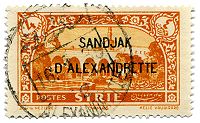Amir Adil Arslan
Amir Adil Arslan ( Arabic أمير عادل أرسلان) (* 1880 in Ash-Shuwaifat, Jabal Lubnan , south of Beirut , Lebanon ; † January 23, 1954 in Beirut) was a Syrian , nationalist politician of the Druze faith. His father was Amir Hamud.
education
- Maronite, French, Christian mission school
- Madrasah al-Hikma
- Ottoman College in Beirut
- French education
- Training at the Ottoman civil service school Mekteb-i Mülkiye
In the Ottoman Empire
Amir Adil Arslan stepped onto the political stage under his uncle Amir Mustafa, the district ruler of the Chouf . Amir Mustafa's rule over the Yazbaki Druze was successfully challenged by Amir Taufiq Majid Arslan .
Like his older brother Amir Shakib, Adil Arslan was a member of the Committee for Unity and Progress (or Unity and Progress Party ).
- In 1913 Adil Arslan became the first secretary in the Ministry of the Interior.
- In 1914 Adil Arslan became head of the immigration office in Vilâyet Beirut .
- In 1915 Adil Arslan became Kaymakam (magnate religious leader) of the Chouf
- from 1916 to 1918 he was a member of the Lebanon Mountains .
According to some sources, he joined a pan-Arab secret society before the First World War. But older sources date its entry after the end of the Ottoman Empire.
After the First World War
Like many others who served the Ottoman Empire, he followed Hussein ibn Ali , who had been promised the government by the British , because of the effective use of his troops under TE Lawrence .
In the autumn of 1919, Adil Arslan was appointed governor of Lebanon, later advisor to the military governor of Syria. In 1920 Adil Arslan became political advisor to Faisal I , who had become king of an independent Syria . Despite the efforts of Adil Arslan and his cousin Amin, most of the Druze in Mount Lebanon followed Nasib Jumblatt or Tawfiq Majid Arslan and accepted the French mandate over Syria.
After the fall of Faisal I, Adil Arslan fled to his brother Abdallah ibn Husain I in Transjordan , where he was appointed head of the Council of State (Diwan) from 1921 to 1923.
Under pressure from the British government, Abdallah ibn Husain I expelled the Syrian, Arab nationalists. Adil Arslan exiled to Saudi Arabia . In Saudi Arabia, Adil Arslan was in close contact with Shukri al-Quwatli and the Istiqlalists (independence movement).
During the Syrian uprisings from 1925 to 1927 he was an active collector of money and leader of the battles. Once again condemned by the French mandate, he continued his activities outside Syria, mainly in Egypt .
In 1931, Adil Arslan was expelled from Egypt for anti- Italian activities and went to Baghdad until Faisal I began to rule under British protection. In 1937 Adil Arslan was in Switzerland and continued his pan-Arab activities.

The Syrian national bloc, to which Quwatli and the Istiqlalists belonged, had reached an agreement with the French mandate and formed a government.
Area issue Alexandretta
Adil Arslan was appointed permanent representative in Turkey , a post he held until 1938 when the İskenderun area issue escalated.
İskenderun , an Ottoman area, had received semi-autonomous status in Syria in 1920 as Sanjak Alexandrette and was incorporated into Turkey in 1939 as Hatay Devleti following an agreement between France and Turkey in 1938 .
In World War II
In 1940 and 1941, Adil Arslan was arrested and released again by the mandate administration under the Vichy regime . Adil Arslan fled to Turkey in late 1941, where he spent the entire Second World War.
Like other Arab nationalist politicians, he sought the support of the German Nazi government . But he was in opposition to Raschid Ali al-Gailani and Mohammed Amin al-Husseini and declined invitations to Germany.
In independent Syria
In 1946 and 1947, Adil Arslan was Minister of Education in two cabinets of the National Party in the independent Syrian Republic and was elected to parliament from the Golan Heights constituency (Arabic: al-Jawlan) in 1947.
In 1947 he was a member of the Syrian delegation in London at the round table talks on Palestine in 1946 and 1947. He was a member of the Syrian delegation to the United Nations and from April 19, 1948 head of the Syrian delegation to the United Nations, resigned on October 20, 1948 back, accusing the Syrian government of losing the Arab cause in Palestine after Israel declared independence in May 1948 and fought the attacking Arab states in order to preserve the new state. Under the fluctuating conditions of Syrian politics, he twice failed to form a cabinet.
On March 30, 1949, Husni az-Za'im bloodless overthrew the democratic government and made Adil Arslan his political advisor. Adil Arslan was Foreign Minister from April 16 to June 26, 1949. After the fall of Husni az-Za'im, Adil Arslan was Syria's permanent representative in Turkey from late 1949 to early 1952.
Writer and poet
He was also a writer and poet, one of his books was called Dhikrayat al-Amir Adil Arslan an Husni al-Za Beirut, 1962, the other Mudhakkirat al-Amir Adil Arslan (Memories of Amir Adil Arslan), Ed .: Yusuf Ibbish, in three volumes Beirut, 1983
source
literature
- Götz Nordbruch : Nazism in Syria and Lebanon. The ambivalence of the German option 1933-1945. Routledge, Chapman & Hall, London & NY 2009 ISBN 0415457149 (online in stores and on Google books; Arslan passim, 13 references)
| personal data | |
|---|---|
| SURNAME | Arslan, Amir Adil |
| BRIEF DESCRIPTION | Syrian, Arab nationalist politician |
| DATE OF BIRTH | 1880 |
| PLACE OF BIRTH | Ash Shuwaifat Jebel Lubnan south of Beirut, Lebanon |
| DATE OF DEATH | January 23, 1954 |
| Place of death | Beirut |
